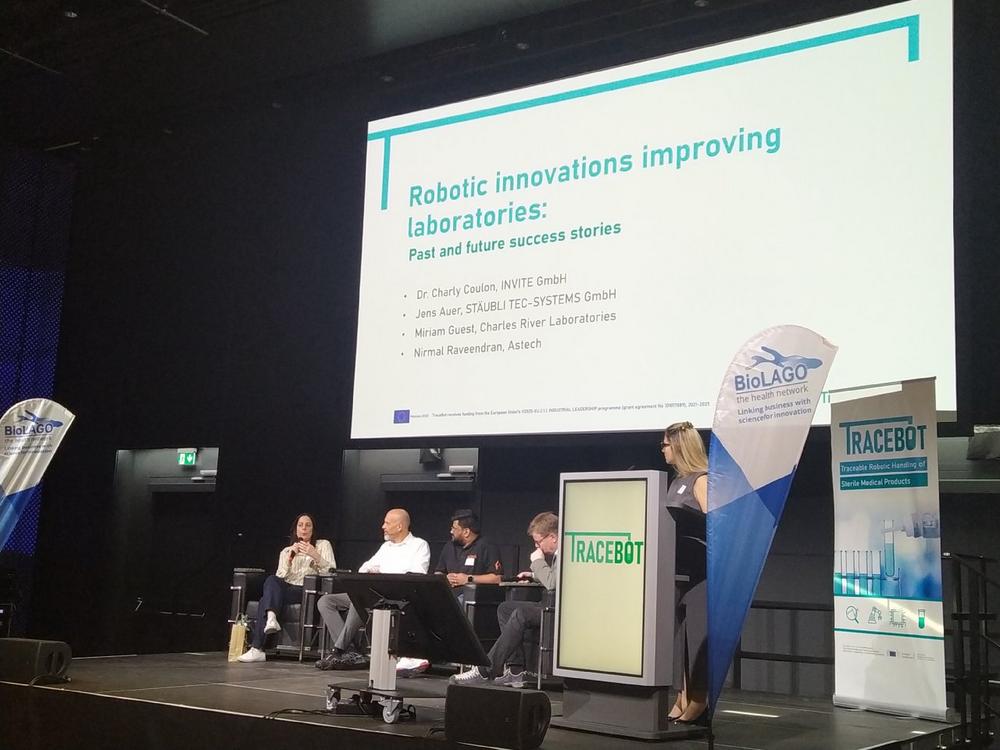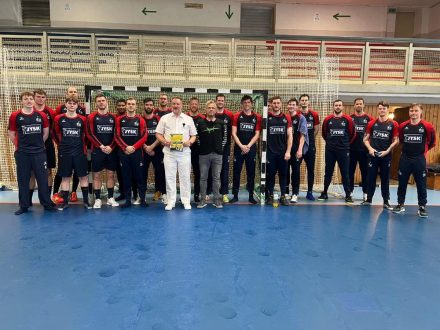
Robotics-4-Labautomation Symposium once again brings together experts from all over Europe
Organised by BioLAGO, experts from six countries across Europe came together to present the latest developments and opportunities in modern laboratory automation. The international speakers were accompanied throughout the day by laboratory and automation specialist Luiza Almeida from the Instituto Pedro Nunes Portugal, who moderated the event.
Results of the TraceBot funding project shared
The second Robotics-4-Labautomation Symposium kicked off with a session on the progress and latest results of the TraceBot funding project. Among others, Prof. Markus Vincze from the Vienna University of Technology gave an impressive report on the project’s success in the recognition of transparent objects. The session was concluded by Dr Charly Coulon from Invite GmbH, who showed how the versatile results of the TraceBot project can be implemented in companies and how they can benefit from them. ‘The TraceBot consortium can be proud of the good progress made over the past three and a half years, which will help us to take laboratory automation in the pharmaceutical industry and beyond a decisive step forward. I am sure that our results will help many companies across Europe to actively develop their laboratory automation. The Robotics-4-Labautomation Symposium in Konstanz is an important platform for raising awareness of TraceBot among laboratory users and robotics experts,’ explains Dr Charly Coulon.
In focus: How can robotics innovations permanently improve laboratories?
The highlight of the event was the keynote speech by Miriam Guest from Charles River Laboratories in the UK. In her interesting presentation, she impressively described the application of automation in GMP laboratories. This was followed by a panel discussion in which the speakers shared success stories of laboratory automation with the audience and explained how modern robotic solutions will bring more efficiency and safety to the laboratory of the future.
The final session of the event looked at trends and future prospects for laboratory automation. Regional and international experts had the opportunity to share their thoughts. The Robotics-4-Labautomation Symposium was accompanied by a diverse exhibition in the networking area. Here, participants were able to experience the latest robotic solutions from the ETO Group and Stäubli up close. In addition, the exhibitors SILA and House of Lab Science presented their offerings for laboratory experts.
‘I am delighted that our symposium has once again brought laboratory and robotics experts from across Europe to Konstanz for a fruitful exchange. The added value of our TraceBot funding project is evident here, because only in this way could we create a framework in which companies and researchers could exchange ideas on the forward-looking topic of laboratory automation in an interdisciplinary way,’ concludes Maike Neumann from BioLAGO, project manager and coordinator of the international TraceBot consortium.
The EU-funded TraceBot project aims to optimise processes in the healthcare sector. By applying the membrane-based sterility test, TraceBot is developing a robotic system that is able to monitor and verify its actions in order to meet the high traceability requirements in regulated environments. With the help of sensor-actuator systems and digital twin technology, the manipulation of the robot is to be automated and a semantic trace of the actions performed is to be generated.
The TraceBot project brings together seven strong partners from five countries: the BioLAGO health network (Germany), the Fundación Tecnalia Research & Innovation (Spain), the Commissariat à l’Energie Atomique et aux Energies Alternatives (France), the Vienna University of Technology (Austria), the University of Bremen (Germany), Astech Projects Limited (England) and Invite GmbH (Germany). This collaboration will enable the development of tactile grippers for the handling of medical products, the development of intuitive programming methods for rapid adaptation to novel products and tasks, and, last but not least, the development of a reasoning framework to monitor and control the safe and error-resistant operation of the robotic system to meet the requirements of safety-critical automation. The coordination, communication and dissemination of the TraceBot project is carried out by the BioLAGO health network (Germany).
Further information can be found on the TraceBot website.
Funding
TraceBot receives funding from the European Union‘s H2020-EU.2.1.1. INDUSTRIAL LEADERSHIP programme (grant agreement No 101017089), 2021-2025
TraceBot
Byk-Gulden-Str. 2
78467 Konstanz
Telefon: +49 (7531) 9215250
https://www.tracebot.eu
project manager
Telefon: +49 (7531) 71409 18
E-Mail: maike.neumann@biolago.org
![]()



